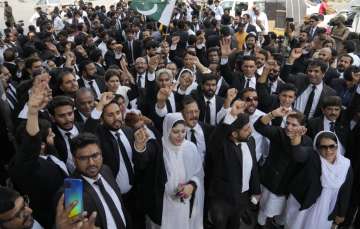Pakistan: ECP official says specific date for elections 'not technically possible' amid criticism
The ECP official said that any official announcement of election dates will start a formal process that has to follow specific timelines.

As discontent grows within Pakistan over the top electoral watchdog's repeated failure to announce the dates for the upcoming general elections, a senior official of the Election Commission of Pakistan (ECP) said that it was "not technically possible" to do the same at this time.
According to Dawn, the official said that any official announcement of the election dates will start a formal process that has to follow specific timelines in the run-up to the elections, under Section 57 of Pakistan's Elections Act. The process includes filing of nomination papers, scrutiny as well as decisions and appeals on their acceptance or rejection.
He also ruled out the possibility of ruling out the delimitation exercise that has prolonged the caretaker regime in Pakistan by delaying elections, saying that elections before November 7 are no longer possible even if the exercise is stopped. However, the ECP official said that elections can be held if the Supreme Court ordered it on the basis of the previous delimitation.
Several political parties, including allies of the previous Pakistan Democratic Movement (PDM) government, have repeatedly called out for an official announcement of the election dates and criticised the ECP for failing to do so.
On Thursday, the ECP announced that the elections would be held in the last week of February 2024. The body said that it reviewed work on delimiting constituencies and decided that the initial list for the delimitation of constituencies would be published on September 27
'Pakistan's electoral body has deepened uncertainty'
PATTAN and Coalition38 - a body of over 150 civil organisations and labour unions in Pakistan, accused the ECP of further deepening uncertainty by giving "an extremely vague statement" about the next general elections and the statement was in constitutional violation. It also noted that the ECP had eroded its credibility and the public's trust by taking 'u-turns'.
"We also note with deep concern that the ECP, instead of holding elections within 90 days of the dissolution of National Assembly, began delimitation of constituencies which was not only based on a flawed and highly politicised population census but [was] also not mandatory under the Constitution," said the civil society coalition in a statement.
The joint statement also alleged that the delays in the delimitation exercise were apparently made to delay the general elections and urged the polls to be held in November.
The Shehbaz Sharif-government dissolved the National Assembly in August 9, three days before the completion of its tenure. The step allowed a caretaker regime to oversee the elections and the ECP to hold the polls within 90 days.
However, Pakistan's Council of Common Interest (CCI) approved the census for this year. A CCI meeting in early August by former Prime Minister Shehbaz Sharif had approved the final results of the seventh Population and Housing Census 2023 that reported the country's population at 241.49 million with a growth rate of 2.55%,
Now, the ECP is constitutionally obligated to hold the elections after fresh delimitations in light of the new census. A schedule published by the Electoral Commission showed that fresh delimitation of the constituencies will take at least four months, making it impossible for the elections to be conducted in 90 days.
Pakistan general elections
Notably, the Pakistan National Assembly has 342 seats-- 272 of which are directly elected, 60 are reserved for women, and ten for religious minorities. According to the country's constitution, at least 70 seats reserved for women and religious minorities are allocated to the political parties as per their proportional representation.
Sharif’s ruling Pakistan Muslim League party (PML-N) is expected to face tough competition from Imran Khan’s PTI party-- though Khan himself would be unable to take part unless his conviction is overturned. Under Pakistan’s laws, no one with a criminal conviction can lead a party, run in elections, or hold public office.